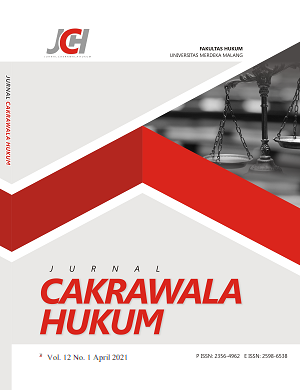Pencegahan tindak pidana terorisme di Indonesia
DOI:
https://doi.org/10.26905/idjch.v12i2.4936Keywords:
Crime, Terrorism, Preventing.Abstract
The various reasons behind the occurrence of this crime are thought to have originated from dissatisfaction with the perpetrator. Dissatisfaction with the economy, law enforcement, social inequality and even dissatisfaction with ideology, are problems that must be resolved. This dissatisfaction is driven by a low understanding of science and knowledge, so that a person or group of people tends to take shortcuts by committing a crime, such as terrorism. The involvement of various parties is important as one of the benchmarks for the success of preventing this crime of terrorism, including the involvement of community organizations such as the Indonesian Ulama Council as an organization to foster people from errors in understanding religious matters. Terrorism is an action that is based on a value system and world view, so that understanding it requires a framework and methodology of thought commonly used in the philosophical tradition. The research method used in this research is juridical-sociological with an empirical approach that is studied philosophically to find a concept of preventing the crime of terrorism through a soft approach.
How to cite item: Mafazi, A., & Bahroni, A. (2021). Pencegahan tindak pidana terorisme di Indonesia. Jurnal Cakrawala Hukum, 12(2), 121-128. doi:https://doi.org/10.26905/idjch.v12i2.4936
Downloads
References
Alius, Suhardi. 2019. Pemahaman Membawa Bencana– Bunga Rampai Penanggulangan Terorisme. Jakarta: Gramedi Pustaka Utama.
Anggriawan, F. 2020. Reformulasi domain hukum ideologi Pancasila oleh Badan Pembinaan Ideologi Pancasila. Jurnal Cakrawala Hukum, 11(1), 31-40. doi:10.26905/idjch.v11i1.4045.
Fisabillah, A., Pujiyono, P., & Rozah, U. 2019. Kebijakan Pemberantasan Tindak Pidana Pendanaan Terorisme Sebagai Transnational Organized Crime Dalam Perspektif Hukum Pidana di Indo- nesia. Diponegoro Law Journal, 8 (4), 2462-2474. Retrieved From Https://Ejournal3. Undip.Ac.Id/ Index.Php/Dlr/Article/View/25506.
Hendropriyono, A.M. 2009. Terorisme: Fundamentalis, Kristen, Yahudi, Islam. Jakarta: Kompas.
Islami, Muhammad Nur. 2017. Terorisme sebuah Upaya Perlawanan. Yogyakarta: Pustaka Pelajar.
Jainuri, Ahmad. 2016. Radikalisme dan Terorisme – Akar Ideologi dan tuntutan Aksi. Malang: Intrans Pub- lishing.
Kaelan. 2018. Negara Kebangsaan Pancasila. Yogyakarta: Paradigma.
Kristian, Dey Ravena. 2018. Kebijakan Krimimal. Jakarta: Kencana.
Nahuddin, Y., & Prastyo, A. 2020. Hubungan agama dengan Pancasila dalam perspektif konstitusi. Jurnal Cakrawala Hukum, 11(3), 282-290. doi:10.26905/idjch.v11i3.4070.
Shodiq, H.MD. 2018. Paradigma Deradikalisasi dalam Perspektif Hukum. Jakarta: Pustaka Harakatuna.
Sutowo, Pontjo., dkk. 2019. Menggalang Ketahanan Nasional dengan Paradigma Pancasila. Jakarta: Kompas.
Thontowi, Jawahir. 2013. Terorisme Negara – Kerjasama Konspiratif Menjinakkan Islam Fundamentalis. Yogyakarta: UII Press.
Wasitaatmadja, Fokky Fuad. 2020 Filsafat Hukum–Akar Religiusitas Hukum. Jakarta: Kencana.
Wasitaatmadja, Fokky Fuad., dkk. 2019. Spiritualisme Pancasila. Jakarta: UAI Press.
Widodo. 2019. Perspektif Hukum Pidana dan Kebijakan Pemidanaan. Yogyakarta: Pustaka Pelajar.
Additional Files
Published
How to Cite
Issue
Section
License
Copyright (c) 2021 Jurnal Cakrawala Hukum

This work is licensed under a Creative Commons Attribution-ShareAlike 4.0 International License.
Authors who publish in this journal agree to the following terms:
The copyright of the received article shall be assigned to the journal as the publisher of the journal. The intended copyright includes the right to publish the article in various forms (including reprints). The journal maintains the publishing rights to the published articles. Authors must agree to the copyright transfer agreement by checking the Copyright Notice column at the initial stage when submitting the article.










